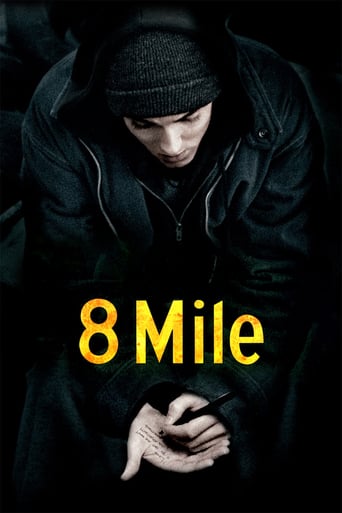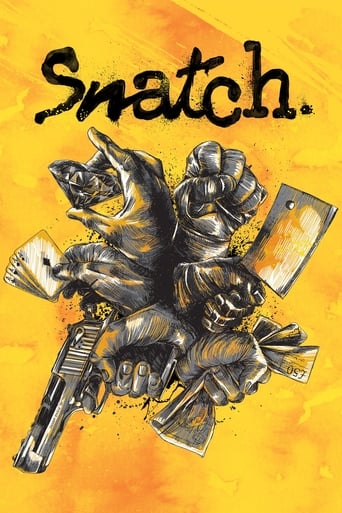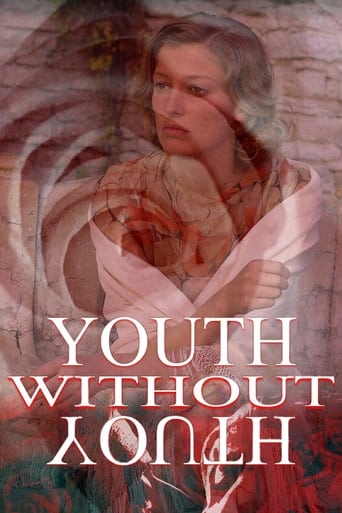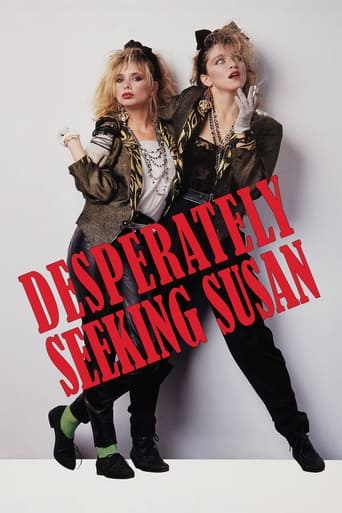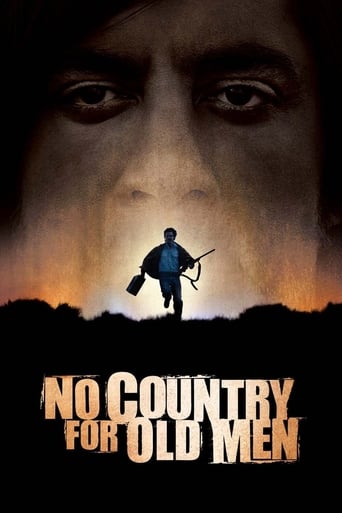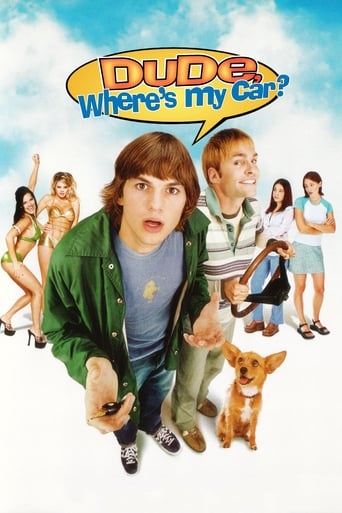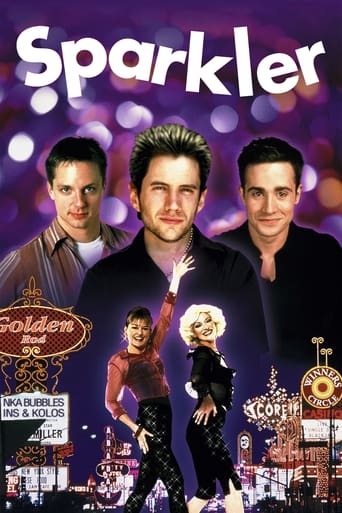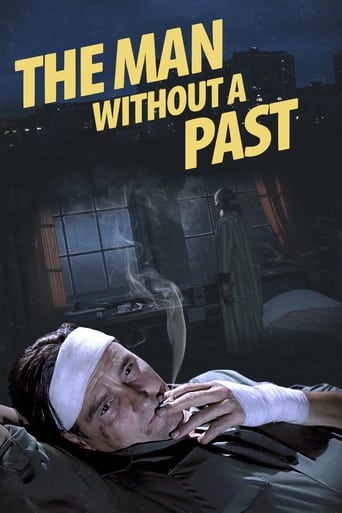
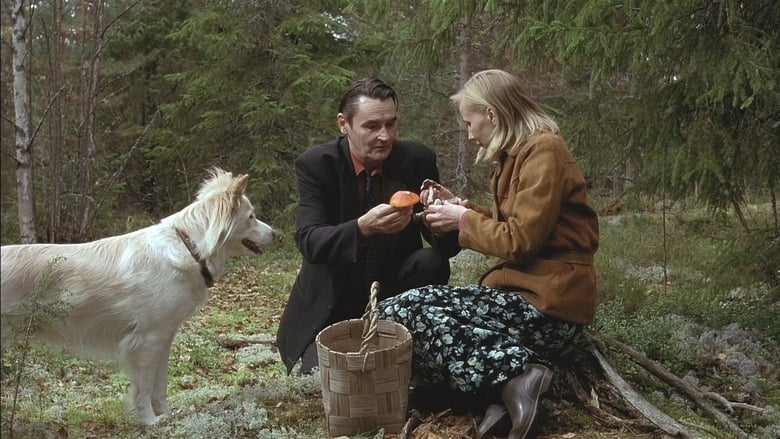
The Man Without a Past (2003)
Arriving in Helsinki, a nameless man is beaten within an inch of his life by thugs, miraculously recovering only to find that he has completely lost his memory. Back on the streets, he attempts to begin again from zero, befriending a moody dog and becoming besotted with a Salvation Army volunteer.
Watch Trailer
Cast


Similar titles
Reviews
Waste of time
Absolutely the worst movie.
One of the most extraordinary films you will see this year. Take that as you want.
This is a dark and sometimes deeply uncomfortable drama
If you had the chance to recreate your life, would you be where you are now? The Man Without a Past, a Finnish film by writer and director, Aki Kaurismäki, allows one man to do just that— though not in the most ideal way. After being severely beaten by three heartless crooks, this man (Markku Peltola) wakes up on a beach inhabited by the homeless (and nearly homeless) without a single memory of his former life—not even his own name. This beach community of misfits, living on the Salvation Army soup kitchen, help nurse the nameless man back to health, and he begins his bewildering struggle to build an identity from nothing. As the nameless man (let's call him M) becomes friends with a man named Nieminen (Juhani Niemela), we see just how poor the people living on this beach are. Nieminen, we discover, is an alcoholic who spends more money on beer than his own children's dinner. Director Kaurismäki, however, does not want the audience to pity this community, but rather, to laugh at it. The people's reaction to M's bizarre situation, for example, is so blasé that they themselves become the ridiculous. "Oh, that's bad," replies Nieminen's wife when M explains his complete memory loss. Well, yes. It is. Though it seems strange to make light of homelessness, the humor is actually what allows the audience to see the characters as people instead of basket cases. When Nieminen says he will be offended if M refuses his offer to buy him a beer, we see that even though they are dreadfully poor, the people that live on this beach still have a deep sense of pride. As M becomes more involved in the community, he travels to the unemployment office in search of a job, as he hopes to live amongst his new friends. Kaurismäki presents a grim view of the welfare system: because he cannot provide a name for the application, M is accused of fraud and is thrown out of the employment office with no help. Kaurismäki, who worked as a post-man, dishwasher, and many other not-so-glamorous jobs before becoming a director, is sending a clear message: dignity is not determined by social class, but rather, by kindness and respect. Shortly after his run in at the employment office, M stumbles into a job at the Salvation Army when a worker named Irma (Katie Outinen) sees that he is highly capable. With his earnings he makes a home for himself in an old storage unit near Nieminen's trailer. Among his few possessions is an old jukebox that blasts 1950s rock 'n' roll music, its lively beat invigorating the slow-paced film. Now M's love interest, Irma—the shy, conservative employee at the Salvation Army who secretly listens to American hits before bed— is easily wooed by his taste in music and unabashed affection for her. Like in M's relationship with Irma, actor Peltola is able to subtly weave M's character into our hearts until, eventually, we realize we've been rooting for him all along. Outinen too is a superb actress. Though she has few lines, when her character Irma is with M, her expression perfectly conveys both the discomfort of an unfamiliar situation and a desire to know what will happen next. Irma is not the only one who M brings out of their shell. M teaches The Salvation Army band, which previously knew only one song (which was, quite simply, a drag), about the glory that is rock 'n' roll. They soon put on a show with the director of the Salvation Army, a woman we learn who has wanted to be a singer her whole life, and the whole community comes together to listen. Things take a turn for the worse for M, however, when he is a witness to a hilariously simple bank robbery: one man and his rifle. The bank clerk nonchalantly brings out the money while M just stands there obliviously. "I'm sorry I have to do this," the robber says, locking them in the vault, to which M replies that he understands given the situation at hand and not to worry about it. Like the idea of a man with severe brain damage waking up in a homeless village and starting a new life with no questions asked, it's the kind of hilarious that hits you three days later when you're brushing your teeth. Unfortunately for M, the police don't find it so funny. Kaurismäki again shows a distaste for state institutions as the police unlawfully detain M for not giving them his name. Irma comes to the rescue, sending M a lawyer who promptly gets M his freedom whose face, we discover, has been plastered across newspapers with the headline "Who is this man?" On his way back to his new home, M is told that his wife contacted the police when she saw his picture in the paper and that he can go back home. But where is home, anyway? M can take back his name, and with it his old life, or he can choose to stay with Irma and his unconventional friends. At the end of this fantastically funny film, Kaurismäki presents a dramatic ultimatum that will change everything for M, as The Man Without a Past is now the man with two futures.
The Finnish film A Man Without a Past directed by Aki Kaurismäki incorporated many universal life lessons in a refreshingly simplistic style. The film although not my favorite, still had great depth and a thoughtful storyline that forced me to reflect on what makes humans truly happy. A Man Without a Past chronicles the events that unfold after a middle-aged man is brutally beaten in a park and unable to remember anything about his past, not even his own name. The film documents this man, known as M, and his journey to creating a new life and the people he meets along the way. Through this journey the theme of American 1950's songs and cinematic techniques shines through and unlike mainstream Hollywood films involving action, sex, and special effects, Kaurismäki is able to touch his audience by portraying women as the hero's and characters who find happiness even as outsiders of a society. From the very first scene of A Man Without a Past" American 1950's style music played in the background creating a setting that the movie was back in time. Throughout the first ten minutes of the film very little dialogue was spoken and the music and lighting took large precedent on the tone the rest of the film was going to take on. To some this music selection could be seen as odd, but director Aki Kaurismäki implements this theme into several of his other films and shorts. It seems he is fascinated by this time period and it is clear that this film was largely inspired by the 1950's in America and rock and roll. For example, we are introduced early on in the film to Irma, a very conservative Salvation Army worker whom lives a very minimalistic life style. Irma settles into her small apartment and falls asleep to a song called "Do the Shake" which made you want to stand up and dance. I was surprised that this was the song choice at first but then felt it added some personality to Irma. Next M finds an old jukebox on the side of the road and hooks it up in his "house", constantly playing old tunes from America while making dinner and doing other various things. He even tells Irma, "I think I want to be a rock and roll manager". Rock and Roll in not the only genre included however, jazz music is also incorporated into the film as well as classical, gospel, and blues. Many scenes, especially involving M and Irma also had songs that felt as if they were from a 1920's film. The dark lighting and jumpy music created an almost black and white feel to those scenes, particularly the ones that incorporated romance. Another way of incorporating this feeling of an older setting was the fade to black cuts that would end a scene. With all of these examples in mind, it seems that these cinematic decisions reflect the director and his love for music and different time periods. Contrary to many Hollywood films, this Finnish film portrayed women as the hero's that helped the men out of their troubles. Beginning with Kaisa nursing M back to health it was understood that she was the decision maker of the home. Even her husband said early on that "she was the boss" which very much differs from the American gender roles. Next M goes to a Salvation Army event in which only men stood in line to be served by all women. It was clear that the men were in distress and the women were there to help them get them back on their feet. Irma also provides M clean clothes and a job to help him figure out his life. Other small, yet significant examples include two older women feeding leftovers to M in a diner, or M's ex-wife coming to the rescue to help him figure out his past. On the flip side the men in this film are seen as either helpless or heartless. For example, the man working at the employment office kicked M out of the building and the police officers tried their hardest to convict M on a crime he didn't commit. The stark differences between men and women is fascinating especially due to the fact the movie was directed by a man. It seems to be a large trend in Nordic film that women are the ones to be respected and that men are the ones who need saving. Although M is able to recover and recreate a new life for himself, without the women he met that would have never been possible. The minimalistic way of living that was portrayed in this film was significant. M and his friends seem to live in old construction containers in which no bathrooms seem to be present and electricity is barely viable. Everyone that M holds a real relationship with involve those who are on the fringe of society. Even M himself said, "no one will want to hire me, I am an outcast". With this said however, the characters that seem to be struggling the most are the ones with the most heart. I believe the message that Kaurismäki was trying to deliver was that money isn't the only thing in life that will get you far. It turns out that M's new life living in poverty is much more fulfilling than his past when he was a bad husband and addicted to gambling. Rebuilding a life is not easy, and for most people it does not involve getting amnesia and forgetting everything about our past. However, A Man Without a Past is able to give insight on how meaningful relationships are a key component to happiness and success when starting over. Through quirky music and old timey techniques along with out of the norm gender roles, this film will leave you pleasantly surprised.
I was looking for foreign language movies to watch and came across this one. I checked the genre and it said 'Comedy-drama'. I didn't see even one ounce of comedy in this film. If this is comedy in Finland, I am never watching any Finnish movie ever again.The plot is good and they could have made a decent movie out of it. But what do we get instead? A load of trash. I need to know if people normally don't smile in Finland or the director has intentionally made the people not smile in the movie? The acting is the worst. No one even makes an attempt to bring justice to their role.They walk like marching. If two people are saying good bye, they either do an 'about turn' and walk away or a sharp right turn as if they are military men. I expected some kind of emotion when the man who robbed the bank settles the pay to his ex employees. All those employees acted as if it is nothing. They didn't even act surprised. Anyway, whoever sent this movie to Oscar must have sworn to destroy the name of Finnish Cinema. It is going to take years before I would even think about watching a Finnish movie.
This movie is just plain awful. There's simply nothing to grasp onto, intellectually, emotionally, or thematically. Some people say they like to "fill in" the meaning of who the characters are and what the film is about, but I think that's hard to do when you're given so little. It's a film constructed as a product of the new Cult of Mediocrity, with its virtuousness being aligned with its absence or lack of things rather than the particular presence of anything. Mediocrity has become a kind of religion in which its priests hold a position of moral superiority against anyone who insists that there is such a thing as individual greatness. Yet anyone who practices this religion is a hypocrite, as it is impossible to go through life without assigning value to things and without admiring products of individual human spirit, even if one isn't conscious of doing so. The intentional blankness of this film delights people today who are offended by the "imposition" of the ideas of an author, the craft of a director or an editor, the skills of an actor, or indeed by the offensive crime of making a good film. A bad film flatters people, as do characters who are inferior to them. But this film is universally loved because the bitter pill of politically correct drab festival fare has been lightened up by a rock and roll number here and a flat joke there. So it's a sort of repressed burlesquing of the festival film, almost a joke about festival films designed to amuse cranky jurors and audiences, and in my view nothing more than a clever balancing act. In the hyper-political film festival world, art has been replaced by politically correct self-effacement. At least a third of the comments here are by people who compare this film favorably to Blockbuster Hollywood films. Their comments reveal that they want to show that they "get it," that they know how to eschew entertainment for political correctness, that they are not like the Philistines out there who expect a movie to have a plot and characters and a point. The fact is that there are really good films out there that are not formula films with linear plots, but that do have a spiritual or intellectual or emotional center, are rigorous, and are ABOUT something. And there are also films with great artistic value that DO contain linear plots and characters. If anything this film is SIMILAR to Blockbuster Hollywood films, in its absence of meaningful motifs and its imposition of social and moral conformism.







